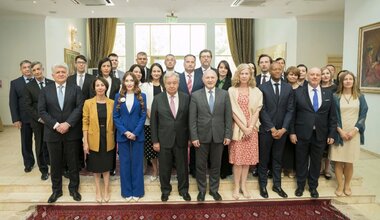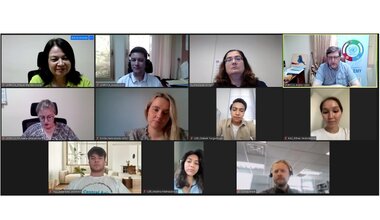Remarks on the International Day for the Total Elimination of Nuclear Weapons
The Secretary-General
--
New York, 26 September 2017
[as delivered]
In recent months, the dangers posed by nuclear weapons have been forcefully driven home, making this event timelier than ever.
We know that the horrific humanitarian and environmental consequences of the use of nuclear weapons would transcend national borders.
As such, every State has a right to demand the elimination of these uniquely destructive weapons.
This is why, for more than seventy years, nuclear disarmament has been a principled objective for the United Nations – from the very first General Assembly resolution to the recently negotiated Treaty on the Prohibition of Nuclear Weapons.
The only world that is safe from the use of nuclear weapons is a world that is completely free of the nuclear weapons themselves.
The goal of such a world is universally held, but of late it has been subject to numerous challenges.
The Democratic People’s Republic of Korea has conducted a series of provocative nuclear and missile tests, heightening tensions and highlighting the dangers of proliferation. I again condemn these acts unequivocally, and I welcome the Security Council’s firm action on the situation as well as its desire for a peaceful, diplomatic and political solution.
I acknowledge the significant efforts that nuclear-weapon States – especially the Russian Federation and the United States – have made in the past to reduce their arsenals and the role of nuclear weapons in their security.
However, expensive modernization campaigns, combined with the absence of planned arsenal reductions beyond the New Start treaty, make it difficult to see how disarmament can make progress.
There remain deep fissures between States over how to achieve nuclear disarmament.
The two-decade-long stagnation at the Conference on Disarmament has exacerbated those rifts.
It is true that we live in challenging circumstances, but this can be no excuse for walking away from our shared responsibility to seek a more peaceful international society.
The Treaty on the Prohibition of Nuclear Weapons will strengthen norms against nuclear weapons.
In moving beyond the development of norms, we need inclusive dialogue, renewed international cooperation and, above all, practical measures for irreversible, verifiable and universal nuclear disarmament.
There are multiple pathways to a nuclear weapon-free world. The states possessing nuclear weapons have a special responsibility to lead by taking concrete steps, including those agreed at various review conferences of the Treaty on the Non-Proliferation of Nuclear Weapons.
But, a world free of nuclear weapons is a global vision that requires a global response.
The United Nations stands ready to work with all of you to achieve this. Every State has a responsibility to contribute.
Thank you very much.
 UN
UN




